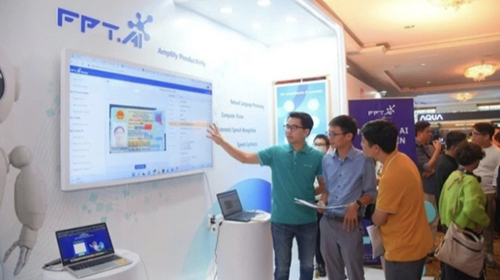This marks the first time Vietnam has entered the top 10 globally in terms of AI awareness and readiness for adoption. The rankings are based on sociological survey data collected across 40 countries. In Vietnam, it was conducted by Indochina Research, involving 900 respondents in four major cities between December 2024 and January 2025.
    |
 |
|
Customers experience FPT Corporation's AI technology. (Photo: FPT Corporation) |
According to the survey, Vietnam scored 59.2 out of 100, placing it above many developed countries. This overall score is the average of seven indicators - AI usage, trust, acceptance, efficiency, usability, comfort, and interest.
Vietnam ranked third globally in AI trust with a score of 65.6 points, and fifth in AI acceptance at 71.6 points. Other indicators, such as AI comfort and efficiency also surpassed global averages. These figures reflect a growing openness and optimism among Vietnamese people, particularly urban residents, in embracing new technologies. However, despite the positive attitudes, actual AI usage in daily life remains relatively low. Vietnam scored only 37.6 in AI usage, ranking 17th out of 40 – the lowest among its indicators.
The survey found that around 60% of residents in the four major cities have used AI technology, but only 3% use it daily. This indicates that while AI is no longer unfamiliar to Vietnamese people, it has yet to become a routine part of everyday life.
According to Xavier Depouilly, General Director of Indochina Research Vietnam, although AI usage frequency in Vietnam remains lower than in some regional countries, young Vietnamese ready to embrace new technologies.
This plays a crucial role in the country’s rapid economic growth and digital transformation, he said. In fact, many initiatives in Vietnam are enabling users to leapfrog outdated technologies and adopt advanced AI applications directly.
The research also shows that young people aged 18 to 34 account for the majority of users, particularly in Ho Chi Minh City and Hanoi. Among the 18–24 age group, active AI usage is especially high, with 89% of respondents in Hanoi and 87% in HCM City saying they used the technology.
By contrast, in Da Nang and Can Tho, rates are significantly lower, particularly among those aged 55 to 64, with only 1 in 10 having ever interacted with AI.
These findings highlight a clear digital divide between major urban centers and second-tier cities, as well as generational gaps in technology adoption, with older generations showing less interest in and familiarity with new technology – a common trend across many countries.
Notably, only 36% of Vietnamese express concern about AI generating misinformation, such as deepfakes or public opinion manipulation - the lowest among all AI-related worries in the country.
Indochina Research’s report offers three key recommendations for Vietnam: expanding access to AI, especially in non-urban areas and among older populations; enhancing public education and communication about the benefits and practical applications of AI, aiming to reduce excessive fear while increasing usage; and building trust by developing transparent, safe, and reliable AI systems that protect privacy and promote responsible technology environments.
The high ranking should not obscure the fact that a large segment of the population still lacks access to AI, the report concluded, adding that this presents an opportunity to scale up experimentation, usage, and the broad dissemination of AI in Vietnam.
Source: VNA